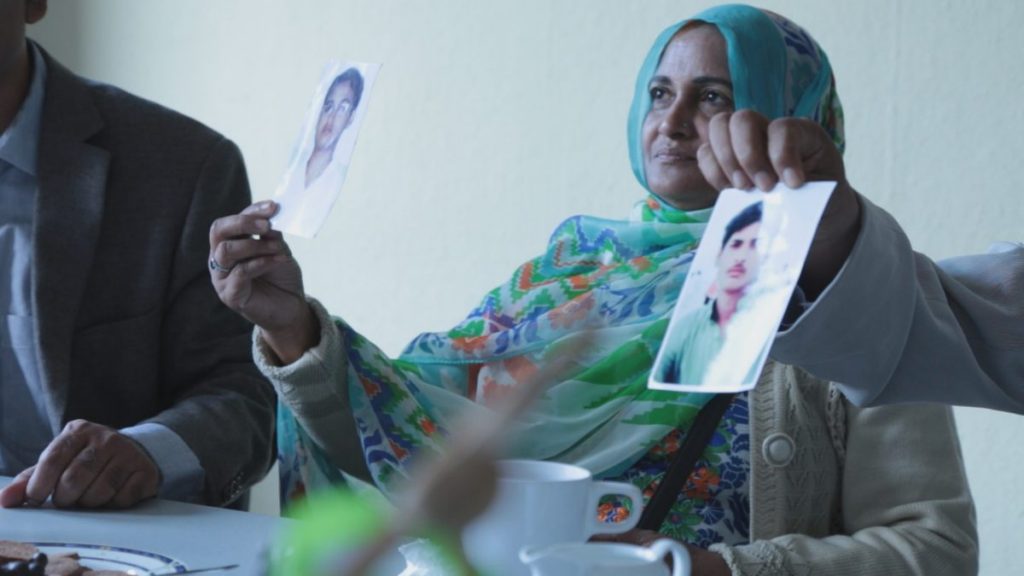
2012 wurden bei einem Feuer in einer Textilfabrik in Karachi 260 ArbeiterInnen getötet, darunter auch der einzige Sohn von Saeeda Khartoum. Sie beginnt einen Wandel zu durchleben – von der Hausfrau und Mutter zu einer führenden Arbeitsrechtsaktivistin, die einen selbstorganisierten Verband leitet, der die Überlebenden und Familien der Verstorbenen repräsentiert. Sie wird von Pakistans größter Gewerkschaft und Anwälten aus Deutschland und Italien unterstützt. Im Namen des Verbandes beginnt sie Gerichtsverfahren in Pakistan, Deutschland und Italien, zuerst gegen die pakistanische Regierung, dann gegen deutsche Modefirmen und schließlich gegen eine private Prüfungsgesellschaft in Italien, die die Fabrik nur 20 Tage vor dem Feuer als „feuersicher“ eingestuft hatte.
Der Film begleitet Saeedas eigenen Wandel eingebettet in den Kontext der weltweiten Arbeitsprobleme um eine Veränderung im internationalen Handel anzustoßen. Schon zu lange nutzen Unternehmen aus dem globalen Norden die Vorteile der Handelsliberalisierung, die es ihnen erlaubt die Produzenten auszubeuten, die Produktionen zu beschleunigen und die Kosten bis zu einem unmenschlichen Level zu senken, aus. Daraus resultierend haben sich die Reallöhne und die Fabrikbedingungen in produzierenden Ländern wie Pakistan seit einem Jahrzehnt verschlechtert; die Anzahl der betroffenen ArbeiterInnen ist enorm. Und trotz der steigenden Zahl privater Prüfungsunternehmen (wobei nordische Kleidungsfirmen nordischen Prüfungsfirmen Geld zahlen, damit diese ihre Fabriken „prüfen und zertifizieren“), halten Industrieunglücke mit erschreckender Regelmäßigkeit an. Das System ist am Ende – während im Süden Elend und Verzweiflung produziert werden, werden für den Norden Tonnen und Tonnen an Kleidung hergestellt. Saeedas Fälle und ihre Mobilisierung stellen eine ernsthafte Bemühung dar, die Situation zu retten, so dass ArbeiterInnen möglicherweise beginnen können, in Würde zu leben.
Die Bilder springen von den Fabriken und den Straßen Karachis in die Büros und Gerichtssäle von Turin und Berlin. Der charaktergetriebene Film ist ein intimes Porträt eines transnationalen zivilen Netzwerks, das einfache Antworten auf ein komplexes Problem gibt: mehr Unternehmensverantwortung im Norden und mehr Arbeiterrechte im Süden. Wir folgen Saeeda von den Straßen und Außenbereichen Karachis in die Gerichtssäle Europas, während sie beginnt zu verstehen, wie die Abläufe und Auswirkungen globaler Versorgungsketten aussehen und begreift, was für diejenigen, die am schlimmsten betroffen sind geändert werden muss, und wie.
CREW
Regie: Christopher Patz & Ammar Aziz
Drehbuch: Christopher Patz & Ammar Aziz
Schnitt:
Produzent: Stefan Kloos, Veronika Janatkova
Produktion: Kloos & Co Medien
Koproduktion:
Verleih:
Dokumentarfilm (80min. / 52 min.)
Regie: Christopher Patz & Ammar Aziz
Drehbuch: Christopher Patz & Ammar Aziz
Ko-Regisseur & Kamera:
Produzent: Stefan Kloos, Veronika Janatkova
Produktion: Kloos & Co Medien
[:en]
[edgtf_tabs tabs_layout=”edgtf-tabs-regular”][edgtf_tab title=”Film”]

A 2012 fire in a Karachi textile factory killed 260 workers, among them widow Saeeda Khartoum’s only son. She begins a personal transformation from domestic mother to leading labour rights activist, heading a self-organised association to represent the survivors and families. Gaining the following of Pakistan’s biggest trade union, she is then supported by lawyers from Germany and Italy. On the association’s behalf, she starts bringing court cases in Pakistan, Germany and Italy, first against the Pakistani government, then the German clothes brand, and finally Italian private auditing company. The latter had audited the factory as “fire safe” just 20 days before the fire.
The film follows Saeeda’s own transformation happening in the context of global workers’ struggle to finally change how global supply chains function. For too long have companies of the global North exploited the benefits of trade liberalisation, allowing them to squeeze producers to speed up production and cut costs to inhumane levels. As a result, real wages and factory conditions have been deteriorating in producing countries like Pakistan for a decade; the amount of workers affected is enormous. And despite the rise of a privatised factory auditing industry (whereby northern clothes companies pay northern auditing companies to “safety audit and certify” their factories), industrial disasters continue with horrific regularity. The system is horribly broken, producing misery and desperation in the South alongside its tonnes and tonnes of apparel for the North. Saeeda’s cases and mobilisation represents a serious and timely effort to fix it, so that workers may begin to live and work with dignity.
Filmed between the factories and streets of Karachi, the offices and courtrooms of Torino and Berlin, this character-driven film is an intimate portrait of a transnational civil network that is championing simple responses to a complex problem; more corporate accountability in the North and more workers’ rights in the South. The film follows Saeeda from the streets and outskirts of Karachi to the courtrooms of Europe, as she begins to understand the workings and effects of global supply chains in her country; as well as what needs to be changed for those worst affected, and how.
CREW
Director: Christopher Patz & Ammar Aziz
Camera:
Script: Christopher Patz & Ammar Aziz
Editor:
Producer: Stefan Kloos, Veronika Janatkova
Production: Kloos & Co Medien
Coproduction:
Sales:
[edgtf_section_title title_tag=”h5″ title=”INFO”]
Documentary (80min. / 52 min.)
Director: Christopher Patz & Ammar Aziz
Script: Christopher Patz & Ammar Aziz
Camera:
Producer: Stefan Kloos, Veronika Janatkova
Production: Kloos & Co Medien
[:]


